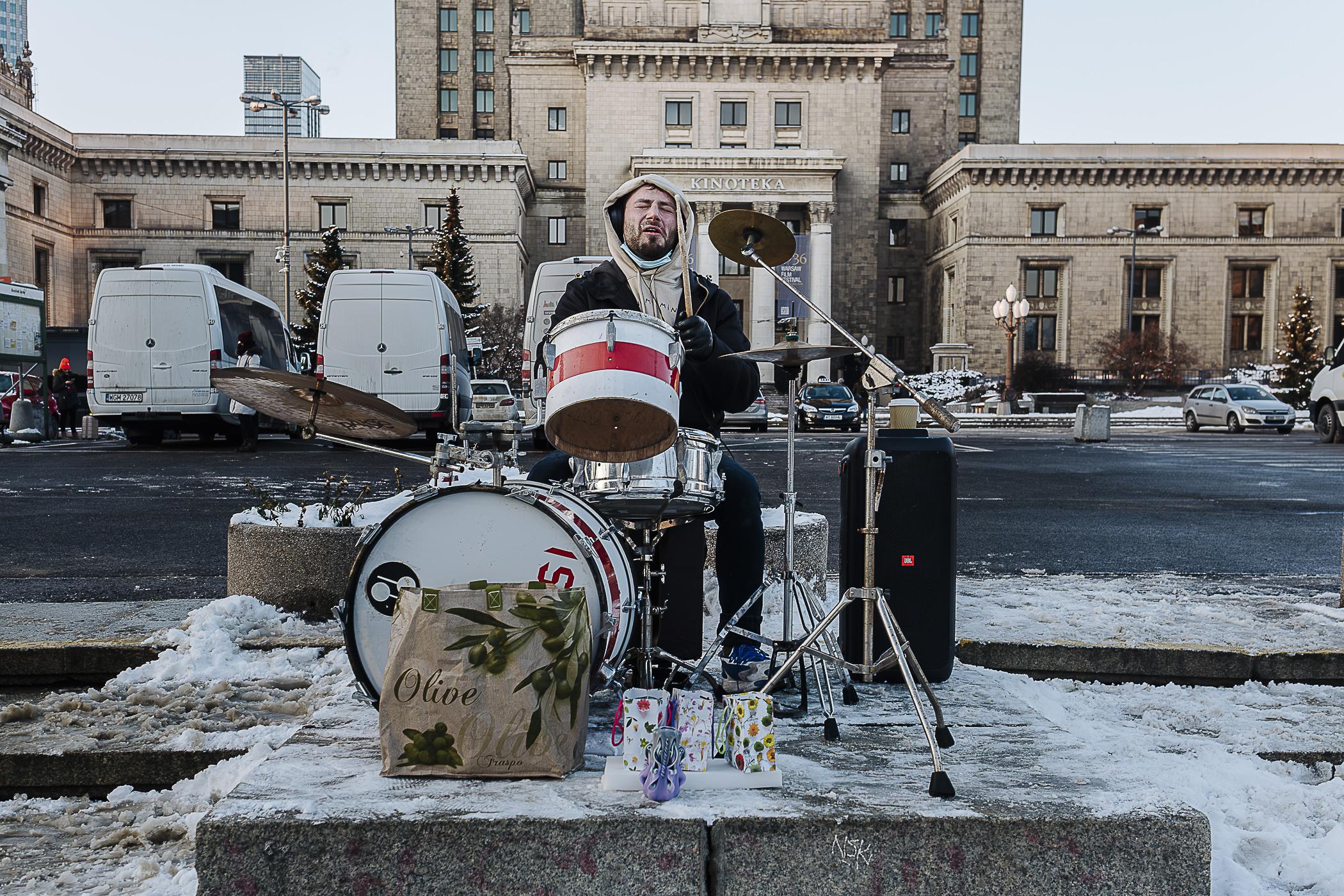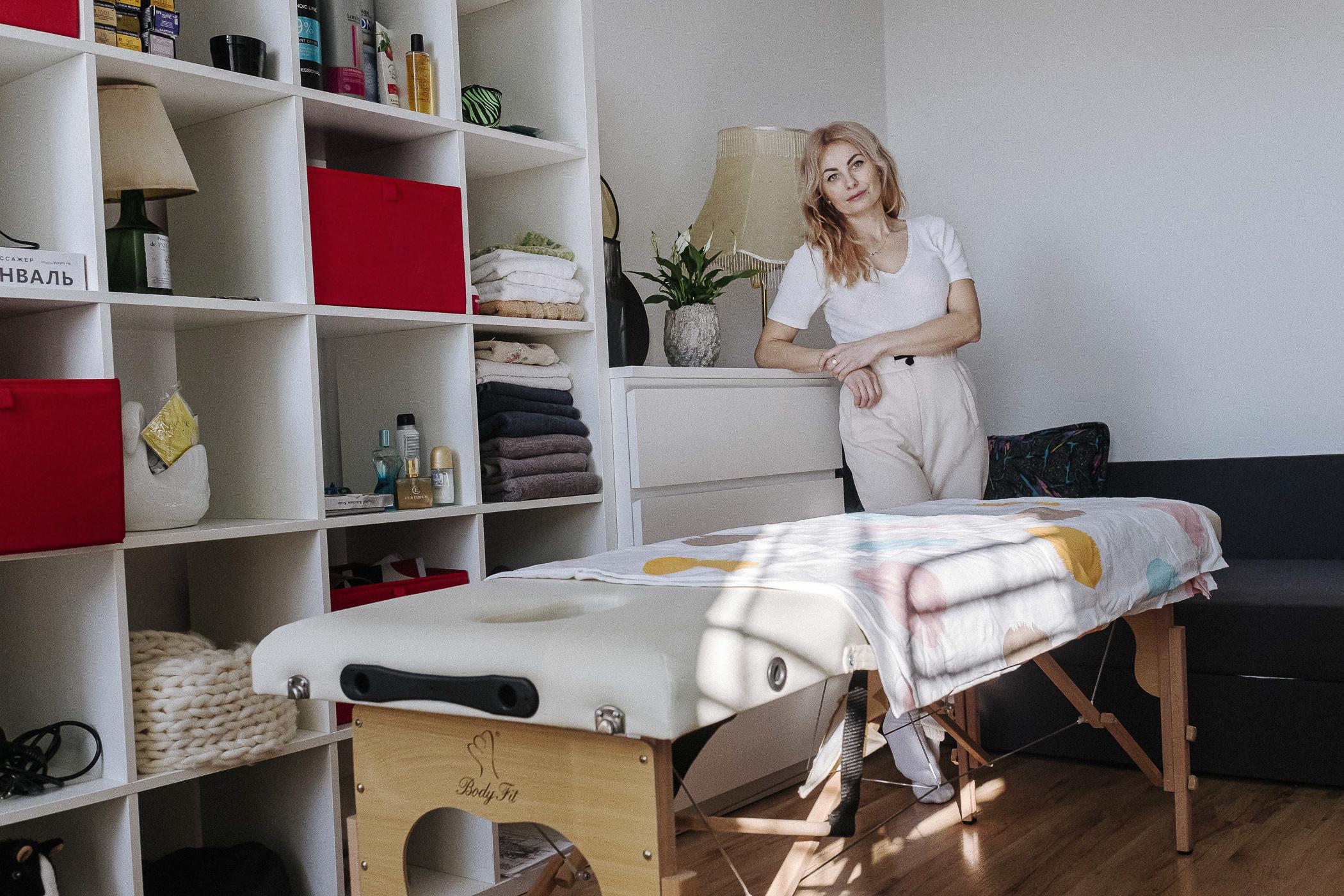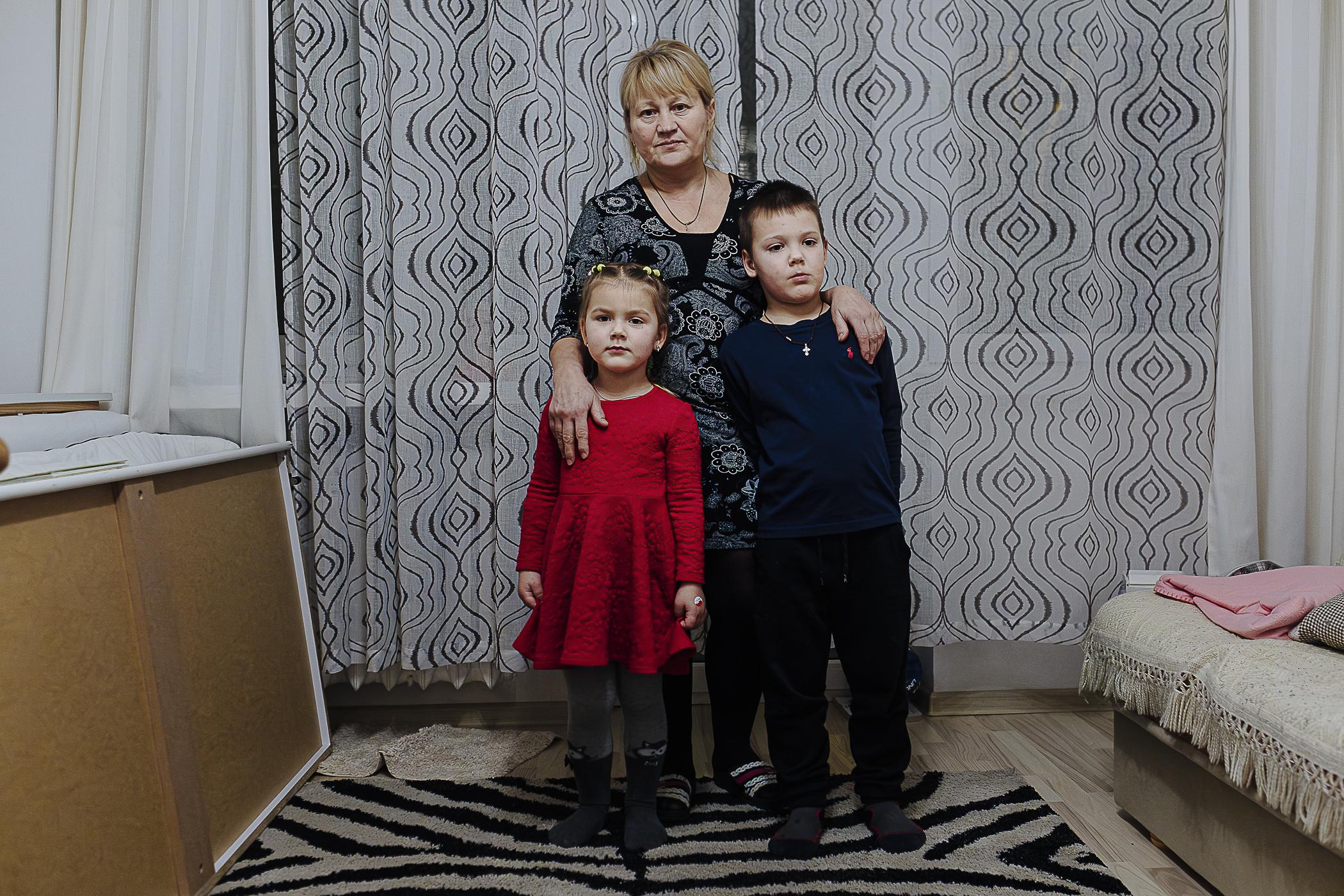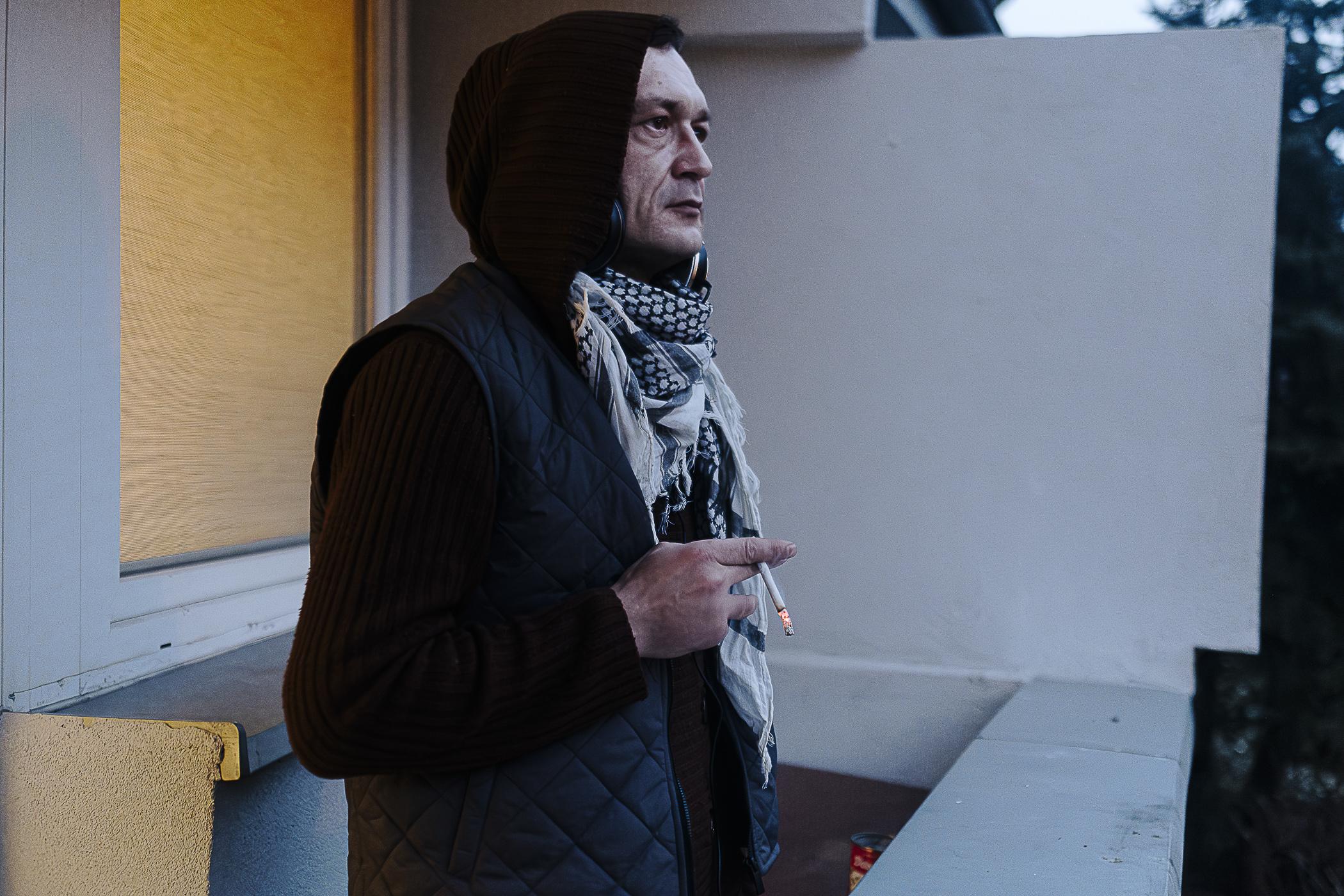compelled to flee, escaping europe's last dictatorship

With a population of 10 million, landlocked between Russia, Ukraine, Poland, Lithuania and Latvia, Belarus is ruled with an iron fist by a president nostalgic for the Soviet Union. Elected for the first time in 1994, Alexander Lukashenko was re-elected in 2001, 2006, 2010 and 2015 with at least 75% of the votes. At the beginning of 2020, several candidates wanted to run for office, but Lukashenko had them and their most active supporters arrested. A woman, Svetlana Thikanovskaïa, wife of Sergei Tikhanovsky, one of the detained opponents, then took over and sparked immense popular enthusiasm.

Natalia (41) is a divorcee and mother of 4 children. She lives in a small apartment in Warsaw with 3 of her children and her friend Oksana (36) and her 2 children. Natalia and Oksana left Gomel, Belarus’ second largest city, after police harassment and several arrests. The two friends regularly participated in demonstrations and have been refugees in Poland since January 17, 2021. Natalia is a masseuse, and she was able to get a table thanks to the generosity of Belarusian compatriots.
A peaceful housewife, now exiled in Lithuania, Svetlana Thikanovskaïa succeeded in rallying the Belarusian people. Yet the electoral campaign was marked by fierce repression, but the hope generated among the Belarusian population was unequalled. Although she was only officially credited with 9% of the vote, the international community considers her to be the legitimate president of Belarus. After the publication of the results confirming the victory of the outgoing president, hundreds of thousands of people across the country took to the streets to peacefully protest what they considered to be a parody of democracy.

The country entered a cycle of repression; 40,000 have since been arrested and more than 500 cases of torture documented. For many, exile became the only option. Poland, the main destination of these exiles, is also the country that vastly facilitated the reception of this wave of refugees. A strong Belarusian diaspora has been living there for many years, and its members, reminded of their origins and identity, have mobilized in an unprecedented way to help their compatriots.



Aged 10, the daughter of Alexander (40) and Jana (34) is in the kitchen of the apartment she shares with her parents and her 3 brothers and sister. In Poland since December 25, 2020, she has not yet been to school. Today she helps her mother to cook, the latter is preparing dranikis -fried potato pancakes- a Belarusian potato-based speciality.


Vera’s daughter is 13 years old. Her parents decided to leave Belarus in December 2020, after a few weeks they finally arrived in Poland and settled in Breslau with the help of the local Belarusian diaspora. His father is currently working on construction sites. Her schooling has become the couple’s priority and they don’t plan to return until they graduate. Vera and her family prefer to remain anonymous.

Slava and Yulia (24) were young doctors in Pinsk, Belarus, which they left on October 26, 2020. Following the arrest of Slava, administrator of an opposition Telegram channel, police pressure became more and more intense. The police began to follow them and then intimidate them at their homes and workplaces. Both of them were fired after signing a petition in support of striking workers, and a final house search forced them into exile. They are taking Polish language courses and hope to be able to resume their practice thanks to an equivalence system set up by the Polish government for health professionals. Every day, they run in a park near their apartment.

A lot of Belarusian refugees spend the first weeks of their Polish exile in a guarded center like the one in Biala Podlaska, located about 30 kilometers from the Belarusian border town of Brest. For several decades, this center has welcomed refugees who wish to apply for political asylum in Poland. Several dozen Belarusians -mostly families- are currently housed there while waiting for their administrative status to be clarified. Those who wish to do so can also live in the city while waiting for their papers. Access to the center is forbidden to the press.

Poland grants humanitarian visas to Belarusian citizens with relative ease. Most of them, once they have their visa, can leave Belarus without too much trouble even if they fear for their relatives left behind. It is difficult for them to return without fear of arrest. Candidates for exile without the precious sesame usually transit through Ukraine. It is also possible to travel through Russia, but many fear being handed over to the Belarusian authorities because of the strong ties between the two countries. If in Ukraine, the fear of the KGB is still vivid, once in Poland, the exiles feel fully safe.

Oksana is waiting for her children outside her local school. They are still finding it a little difficult to keep up, but they are receiving support classes in Polish and should be fully integrated within a few months. The Polish government has facilitated the integration of Belarusian children.

Oksana (right) and Natalia (left) pick up their children from the Polish school where they have been attending since their arrival. Nathan (6 years old), Nikita (11 years old), Sofia (6 years old) and Arthur (8 years old) attend the same classes as their little Polish classmates. They are still having a little trouble keeping up, but they are receiving support classes in Polish and should be fully integrated within a few months. The Polish government has facilitated the integration of the Belarusian children.

Dimitri is 41 years old and comes from Minsk where he spent several weeks in prison. Father of 2 young children, he had to flee Belarus after being tortured in prison by the police. Before his arrest, he was driving by a demonstration, honking his horn to show his support for the opponents of President Lukashenko. Now considered a criminal, it is no longer possible for him to return to his country. Dimitri now lives in an apartment-hotel in the city of Lodz in central Poland. The first months of rent were covered by members of the Belarusian diaspora in Lodz, but he soon had to find a job in construction to support himself.

Denis is 40 years old, he currently lives in Biala Podlaska not far from the border. Rather suspicious, before meeting him I had to send him a copy of my French press card. Originally from Minsk, he participated in many peaceful demonstrations in August, September and November 2020. On the 23rd of September he was arrested for the first time, then a second time where he was beaten by OMON, members of the Belarusian riot police. He decided to leave Belarus soon after. Married, his wife stayed with their daughter in Belarus until he found a flat and a job. This watch is one of the few things he took with him into exile.

Oksana (36 years old) and her daughter Karina (15 years old) take advantage of an errand to spend some time alone together. They now share a small apartment with Natalia and her 3 children. A photographer, Oksana lost her camera confiscated by the police. In Warsaw, their apartment is located several kilometers from the city center, they have to take several buses to go to a meeting in a shopping mall with a member of the Belarusian diaspora who comes to their help and will give Oksana a new camera.

After his 3 imprisonments, Alexander (54 years old) felt that it was dangerous for him to stay in Belarus. He made the choice to leave with his wife and their two children, Kirill, 7, and Irina, 5, with whom he plays in front of their apartment. The family chose to live in Biala Podlaska, which is home to one of the two refugee camps for Belarusians. Alexander is a managing director of an IT company in Minsk, and he plans to open a branch in Biala Podlaska.

Veronika (47) is Alexander’s wife. Unlike her husband, she cannot continue her professional activity from Poland. Since her arrival, this trained pedagogue and psychologist has been taking online courses at a Belarusian university in management. She expects that she will soon be barred from accessing this education as a result of her fleeing the country. Their life in Biala Podlaska is easier than in a city like Warsaw. The cost of living is lower and their apartment is much larger than the one they had in Minsk.

Leonid (38 years old) and Andrei (40 years old) did not know each other before sharing an apartment in this building in the suburbs of Wroclaw. This apartment, like dozens of others in Poland, was rented by members of the Belarusian diaspora who set up solidarity networks to welcome these exiles as best they could within their means. Through associations or foundations, they vouch for the tenants and often pay the first months’ rent. They also provide food aid and support the refugees in their administrative procedures.

Much of Alexander and Jana’s stuff comes from donations from members of the Belarusian diaspora. A couple of Dutch Belarusian volonteers visited them to give them things that were gathered by the diaspora. Alexandre and Jana had to flee Grodno because of Alexander’s involvement in the strike at the factory where he worked. The political leader put pressure on Alexander and the KGB had also started to threaten him. Fleeing appeared to him as the best option.

Yaroslav (47) does not enjoy his stay in Poland. He is not allowed to work and his ex-wife who stayed in Belarus, the mother of his son, was against their departure. There is little entertainment for refugees like him. So he often walks around Krakow’s historic city centre, which has beautiful architecture. Krakow is unique in that it has not suffered any major destruction since the Swedish invasion in the 17th century.

Alexis (29 years old) and Alyona (26 years old) have been in a relationship for several years. While Alexis had long ago obtained a job with Ryan Air in Poland, his girlfriend Alyona had to flee Belarus by using a smuggler to cross the Russian border. Alyona, a news anchor on one of the main Belarusian television channels, refused in August 2020 to lie on the air about the turnout figures for the presidential elections. Dismissed and then imprisoned for having filmed a violent arrest on the streets, she then decided to flee. From Wroclaw, she launched a YouTube channel for Belarusians living in Poland.

Irina, 5 years old, plays in her room. She arrived with her parents and her brother Kirill (7 years old) in the small town of Biala Podlaska on January 26, 2021. Her parents, Alexander and Veronika, were campaigners for one of the opposition candidates, now in prison; Viktor Babariko. She is attending the nearby school and is just beginning to learn Polish. Her father Alexander was arrested on July 16, 2020, September 27, 2020 and October 27, 2020 and had been on hunger strike for 13 days before deciding to go into exile.

Roman (left), Oleg (centre) and Ela (right) play in Vassili's flat, which they got to know through his performances in the streets of Warsaw. The four of them have put together a band that reflects their origins and family histories, with songs in Russian, Polish and Belarusian. Oleg is Ukrainian with Polish roots, while Ela is Polish with Belarusian roots. At the moment, they only have 4 original songs in their repertoire, but they hope to have more when the bars and concert halls reopen.

Alexei (40) in the bedroom of the flat he shares with Leonid. Alexei was close to Svetlana Thikanovskaya’s husband, they shared the same democratic aspirations for their country. Because of this closeness, Alexei had to leave his country in October 2020. He was working in the banking system, and was lucky enough to find an executive position with an Asian multinational with offices in Warsaw. Married with a family, he hopes that his relatives will soon be able to join him and live together.

Members of the Belarusian diaspora and refugees refugees regularly get together for cultural and festive events. On this day, an outing was organised to the small town of Inowroclaw in northern Poland, where where Jazep Najdziuk (Józef Aleksandrowicz in Polish) lived and is buried, Belarusian independence activist, writer, columnist, printer and member of the Council of Self-Help of the Belarusian People during the Second World War. Texts by Jazep Najdziuk were read at his grave in the presence of some twenty of Belarusians.